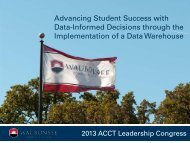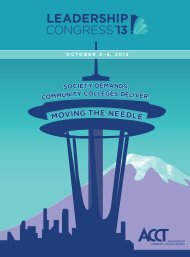Create successful ePaper yourself
Turn your PDF publications into a flip-book with our unique Google optimized e-Paper software.
The son of German immigrants, <strong>Anthonisen</strong> grew up speaking<br />
German and living in a couple of small rooms in the back of<br />
the family’s delicatessen in Queens, which shared a block with<br />
a russian barber shop and an Italian grocery store. “Germans,<br />
Poles, russians — we all played together,” he says. “We didn’t<br />
know we were poor. We just didn’t have much.”<br />
When he was 11, <strong>Anthonisen</strong>’s parents sold the delicatessen<br />
and moved upstate to start a poultry farm in orange County,<br />
where he would ultimately spend most of his adult life. but the<br />
New york native also has lived in California, korea, and Canada,<br />
among other places. After earning a master’s degree at Clarkson<br />
and working at the state’s transportation and environmental<br />
conservation agencies, <strong>Anthonisen</strong> spent a year at McGill<br />
university in Montreal before transferring to Cornell university,<br />
where he earned his doctorate and published numerous works<br />
on the biological treatment of concentrated agricultural waste.<br />
“I wanted to work on producing energy from methane<br />
obtained from organic wastes — but energy was too cheap at<br />
the time to justify the research,” he says. Instead, he studied<br />
nitrification and its role in processing municipal, agricultural and<br />
industrial wastes, and his doctoral research remains frequently<br />
18<br />
SPRING 2009 TRUSTEE QUARTERLY<br />
cited to this day. (A Google search for his name returns<br />
innumerable results, ranging from community college issues to<br />
citation of his research in a paper called “oxygen Transfer at<br />
high solids Concentrations.”)<br />
but <strong>Anthonisen</strong> wasn’t comfortable in the academic world, so<br />
he returned to orange County as an environmental engineer, at<br />
first working with poultry farms on organic waste issues, then<br />
consulting on commercial and industrial projects and becoming<br />
involved in real estate development. Those projects earned him<br />
seats on community organizations, including the local chamber<br />
of commerce and economic development corporation — a<br />
role that ultimately would lead him back to academia at the<br />
community college level.<br />
“I got involved in workforce development because without an<br />
educated workforce we couldn’t attract businesses,” he says. he<br />
was appointed to the orange County Community College board<br />
of Trustees in 1989, at a time when the school was developing a<br />
master plan for needed facilities and technology.<br />
“I would like to think we are at the cutting edge, but the<br />
truth is that technology is changing so fast we need additional<br />
resources just to keep up with the high schools,” he says.<br />
“Just as we made education<br />
accessible in the 1940s,<br />
this is now happening<br />
globally. the people<br />
may speak different<br />
languages, but they<br />
want the same thing —<br />
Jobs, and to be educated.”<br />
kEITh wELLER





